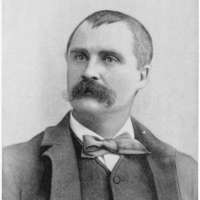The Loving Cup of the Papyrus
WISE men use days as husbandmen use bees,
And steal rich drops from every pregnant hour;
Others, like wasps on blossomed apple-trees,
Find gall, not honey, in the sweetest flower.
Congratulations for a scene like this!
The olden times are here—these shall be olden
When, years to come, remembering present bliss,
We sigh for past Papyrian dinners golden.
We thank the gods! we call them back to light—
Call back to hoary Egypt for Osiris,
Who first made wine, to join our board to-night,
And drain this loving cup with the Papyrus.
He comes! the Pharaoh’s god! fling wide the door–
Welcome, Osiris! See—thine old prescription
Is honored here; and thou shalt drink once more
With men whose treasured ensign is Egyptian.
A toast! a toast! our guest shall give a toast!
By Nilus’ flood, we pray thee, god, inspire us!
He smiles—he wills—let not a word be lost—
His hand upon the cup, he speaks:—
‘Papyrus!
“I greet ye! and mine ancient nation shares
In greeting fair from Ammon, Ptah, and Isis,
Whose leaf ye love—dead Egypt’s leaf, that bears
Our tale of pride from Cheops to Cambyses.
‘We gods of Egypt, who are wise with age—
Five thousand years have washed us clean of passion—
A golden era for this board presage,
While ye do keep this cup in priestly fashion.
’We love to see the bonds of fellowship
Made still more sacred by a fine tradition;
We bless this bowl that moves from lip to lip
In love’s festoons, renewed by every mission.
‘Intern the vessel from profaning eyes;
The lip that kisses should have special merit;
Thus every sanguine draught shall symbolize
And consecrate the true Papyrian spirit.
’For brotherhood, not wine, this cup should pass;
Its depths should ne’er reflect the eye of malice;
Drink toasts to strangers with the social glass,
But drink to brothers with this loving chalice.
‘And now, Papyrus, each one pledge to each:
And let this formal tie be warmly cherished.
No words are needed for a kindly speech—
The loving thought will live when words have perished.’

